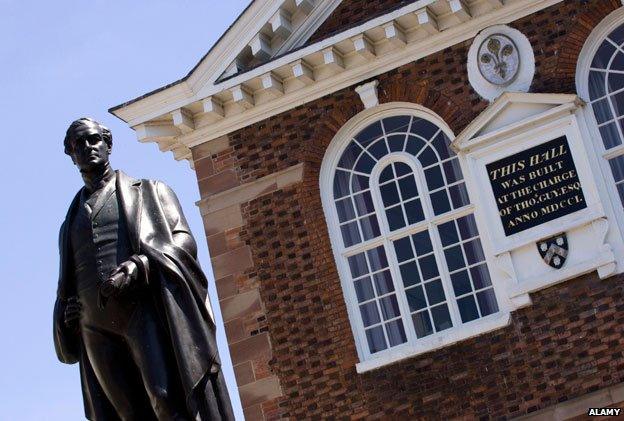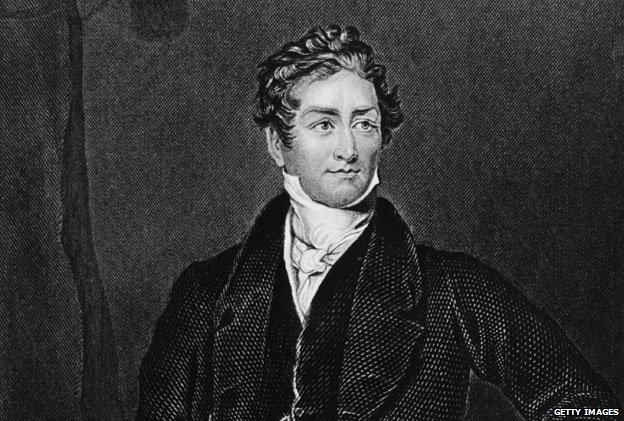The Vocabularist: Where did word 'manifesto' come from?
- Published

Sir Robert Peel created the Tamworth manifesto
The week's election-speak has been dominated by the word "manifesto" - whose final "o" echoes the romance and grandeur of Italy, where it was borrowed from, says Trevor Timpson.
Manifestus - meaning clear, public or notorious - is common in classical Latin. The gods whose images Virgil's hero Aeneas saved from burning Troy later appear to him "multo manifesti lumine" - manifest in a great light.
It may once have meant "struck by the hand" - and therefore "obvious" - from manus "hand" - and an old word related to our "defend" and "offend" but not to "feast" or "festive".
By the 17th Century it was being used in Italian for a statement of views or policy by a person in the public eye. Bishop Marco Antonio De Dominis - a sort of "religion tourist" who became an Anglican and lived off the English state until he changed his mind - wrote a declaration in 1616 which he called "mio manifesto".
The word was soon embraced by British writers, though other languages found the Italian form less alluring - Marx's Communist Manifesto of 1848, for instance, was originally "Manifest der Kommunistischen Partei" in German.
In the 19th Century, British party leaders' letters to their constituents came to be widely quoted as statements of their policies. Conservative Sir Robert Peel's letter to the electors of Tamworth distanced him from the old Toryism of his predecessor Wellington, and pledged "the firm maintenance of established rights, the correction of proved abuses and the redress of real grievances". It became celebrated as the "Tamworth Manifesto".

Sir Robert Peel's Tamworth Manifesto was a landmark publication
The Bible is divided into chapter and verse, a dictionary is a list of words, and a subdivision of a manifesto is a pledge.
Journalists love to say "pledge" - it sounds punchier than "promise" and allows the writing of headlines line "Polish pledge left on the table" which give a shine to any story.
The word's most famous poetic use is in the sense of making a vow to someone by drinking to them. "Drink to me only with thine eyes, and I will pledge with mine" wrote Ben Jonson in 1616.
But its history is rather less sentimental.
It comes from an old Germanic word meaning to promise, but with the connotation of giving something - or someone - in security. And so in old French and from there in English, it could mean "hostage".
In the 11th-Century Song of Roland Charlemagne demands good hostages - "Bons pleges".
In Shakespeare the hostage connotation sometimes remains - the Duke of York in Richard II says of his son "I am in parliament pledge for his truth and fealty".
One sense of "pledge" - as the object given to a pawnbroker which is forfeited if a debt is not repaid - retains the meaning not just of a promise, but of risking something if it is not kept.

The Vocabularist

Subscribe to the BBC News Magazine's email newsletter to get articles sent to your inbox.